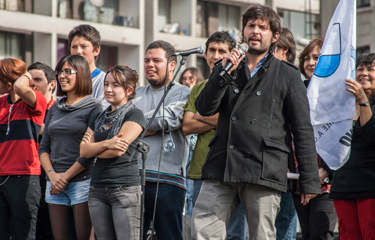Gabriel Boric, the 35-year-old leftist candidate for the presidency of Chile, was elected to lead the country for the next four years on Sunday, 19 December.
Boric, who has questioned the environmental sustainability of the country’s USD 4 billion (EUR 3.5 billion) salmon-farming industry, won 56 percent of the vote, defeating right-wing candidate José Antonio Kast by more than 10 points, according to the Associated Press.
Boric belongs to Convergencia Social (“Social Convergence”), a left-wing political party, and following the president primary contest in July, he became the candidate of the Pacto Apruebo Dignidad (“Approve Dignity”) coalition. A native of Chile’s southernmost region, Magallanes, he was president of the student federation of the University of Chile and continues to be associated with the country’s powerful student movement. He has been a member of Chile’s congress since 2014.
Boric based his presidential campaign on decentralization, feminism, taking greater action on the climate crisis, and improving working conditions, looking to create a government that guarantees universal social rights to its citizens. He has called for new taxes on wealth and reduced tax exemptions on profits.
During his electoral victory speech, Boric said he will also focus on environmental sustainability and will oppose initiatives that “destroy” the country. He did not mention the salmon industry but expressed opposition to the Dominga iron-, copper-, and gold-mining project, which has been delayed for years amid strong opposition from social and environmental groups over fears that the project will cause serious environmental damage.
“To destroy the world is to destroy ourselves. We do not want any more sacrifice zones, we do not want projects that destroy our country, that destroy communities and I exemplify this in a case that has been symbolic: No to Dominga,” he said during his speech.
In response, the Chilean Salmon Council said it hoped Boric will look to engage with the industry to drive sustainable growth.
“We hope that the president-elect will advance on a path of construction of agreements and search for points of mutual accord for Chile to have a good future, resuming the virtuous path of sustainable growth and progress for its people,” Chile’s Salmon Council Executive Director Joanna Davidovich told SeafoodSource in a statement. The council, which brings together companies that represent more than 50 percent of Chilean salmon production, recently released its first-ever sustainable impact report.
However, if Boric holds true to his previously expressed views concerning the salmon-farming industry, changes can be expected.
“There are areas that do not meet the requirements for aquaculture concessions – with low water circulation, for example, concessions that are within marine protected areas and coastal marine spaces of native peoples or in spaces where there are conflicts with Indigenous peoples, which cannot continue where they are and need to be evaluated,” he told local publication SalmonExpert. “A territorial reorganization is required, with spatial marine planning, through which the Suitable Areas for Aquaculture [AAAs according to the Spanish acronym] can be reevaluated with new parameters where the AAAs actually are suitable, evaluating the proximity of the aquaculture concessions – a very important factor when it comes to contagion between centers – and the ecological, not only economic or productive, capacity of the marine ecosystem."
Boric said the expansion of salmon farming in his native Magallanes Region threatens numerous national parks and protected areas and their biodiversity and ecosystems.
“Tourism based on ecosystem conservation is key for the region,” he said. “The justification for transferring salmon farming to Magallanes from the Los Lagos and Aysén regions was that the problems present there such as sea lice would not develop in Magallanes due to the pristine and cold-water conditions, but in reality [those problems] were transferred [to Magallanes]. We need to find the best ways to solve these problems.”
Boric’s proposed priorities concerning Chile’s salmon-farming industry include:
- Conducting an evaluation of the environmental and economic impact of aquaculture in the southern macrozone, especially in terms of water quality, biological diversity, and sea floors.
- Increasing investment in Sernapesca, Chile’s fisheries and aquaculture agency, allowing it to conduct additional, more-thorough salmon-farming inspections, including the use of state-of-the-art technology, training of new inspectors, and the construction of new vessels.
- Increasing funding for Sernapesca to ensure salmon farms are compying with the country’s environmental rules.
- Completing a territorial reorganization and reassessment of the country’s AAAs.
- Studying the impact salmon-farming densities have on the environment and decreasing permitted densities if deleterious impacts are discovered.
- Evaluating outsourced service provider companies to determine whether those firms operate within acceptable environmental and social standards.
- Promoting dialogue between the industry’s corporate leaders and workers to define how to improve the production process to make it more sustainable without harming employment.
Photo courtesy of Pablobellr/Shutterstock







